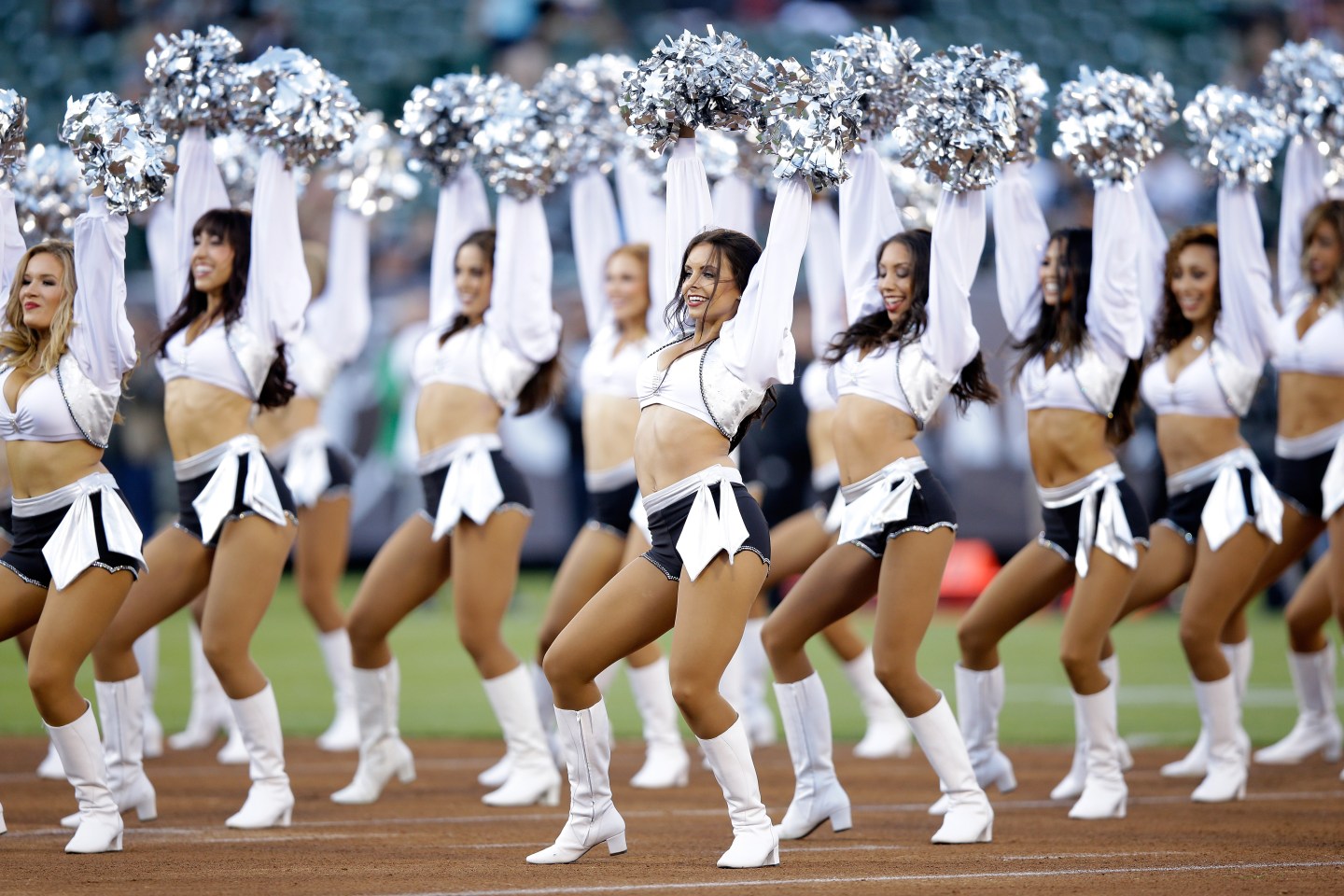Raiderettes – $1.25M, Raiders – 0
Eight months after they sued the Oakland Raiders for failing to pay the minimum wage, two former cheerleaders are set to receive a chunk of a $1.25 million settlement with the team that was filed in Alameda Superior Court in California on Thursday.
The cheerleaders, who go by Lacy T. and Sarah G., claimed in January that the team broke state minimum wage laws, withheld wages for months, and refused to reimburse the cheerleaders for their business expenses.
The plaintiffs won their first victory in July, when the team agreed to pay the cheerleaders $9 an hour, plus overtime, instead of a flat $125 per game. The cheerleaders typically work about 350 hours each year.
The settlement finalized Thursday, which must be approved by the court, will cover cheerleaders who have worked for the team since the 2010-2011 season and will award them back pay worth $2,500 to $6,000 for each season worked. Lacy T. and Sarah G. will receive an additional $10,000 each for bringing the case.
Fast-food workers’ civil disobedience
Nearly 500 fast-food workers and their supporters were arrested Thursday as industry-wide strikes hit 150 locations across the U.S. Even a U.S. Congresswoman, Gwen Moore, a Democrat in Wisconsin, was handcuffed during a protest in Milwaukee.
“I take great pride in supporting Milwaukee workers as they risk arrest in pursuit of a brighter tomorrow for their families,” Moore said in a statement after the arrest.
The nationwide strike was the seventh coordinated effort since the movement, backed by the Service Employees International Union, launched in New York City in November 2012.
Going into Thursday’s strikes, the workers had planned to deploy civil disobedience tactics as they protested the industry’s wages and called for a $15 an hour minimum wage and union representation. The strategy stemmed from the workers’ first-ever convention, held in Chicago in July, when 1,300 attendees promised to do “whatever it takes” to achieve their goals.
The arrests Thursday took place across the country—from New York to Detroit to Chicago to Little Rock to Las Vegas. In New York City’s Time Square, 19 fast-food workers were arrested for blocking traffic.
Rob Green, the executive director of the National Council of Chain Restaurants, said in a statement that the activities were being “coordinated, financed, and facilitated by labor unions—desperate for new membership dues,” and that they “accomplish absolutely nothing.”
“Right to work” advocates notched a big win at the 7th Circuit Court of Appeals in Chicago on Wednesday, when a three-judge panel upheld the state’s law that prohibits workers from being forced to join a union or pay dues as a condition of employment—a policy that’s seen as choking off organized labor’s life source.
Federal law requires that unions represent all workers in any given bargaining unit. Instituting a “right to work” law, in essence, allows workers to benefit from union membership without having to pay for it. The so-called free rider problem is considered a huge threat to unions nationwide.
The 2-1 decision upholding Indiana’s “right to work” law is especially notable because when the state passed the legislation in 2012, it was the first state to do so in a decade and prompted others to consider similar measures. There are currently 24 “right to work” states in the U.S., according to the National Right To Work Legal Defense Foundation, which advocates for “right to work” policies.
California is set to become the second state in the nation to require that private sector workers receive paid sick leave. The state legislature passed the measure over the weekend and Governor Jerry Brown has signaled that he will sign it.
Connecticut is the only other state that demands employers provide their workers with sick days. Several cities have adopted such policies, including New York, Portland, San Diego, and Seattle.
California’s policy will allow a worker to accrue an hour of paid leave for every 30 hours they work, earning at least three sick days (or 24 hours) for the year. The legislation will likely affect a large swath of the country’s most populous state. The Institute for Women’s Policy Research last month discovered that an estimated 44% of Californians do not have access to paid sick days.







